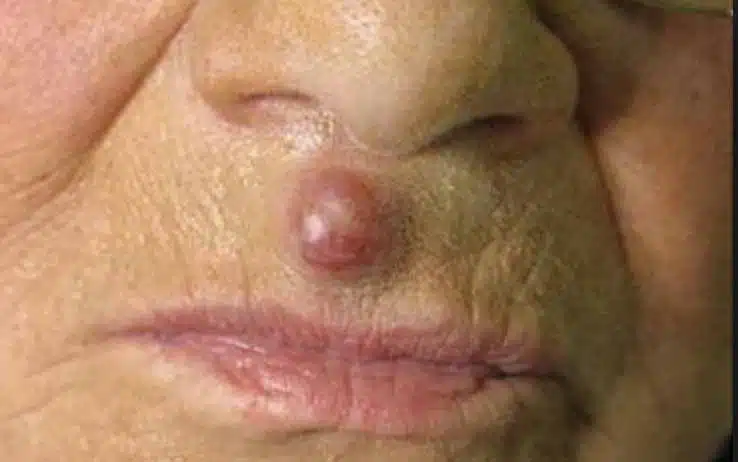On September 1st, 2023, Jimmy William Buffett, a great American musician and singer-songwriter, passed away surrounded by family and friends. Cause of death, skin cancer. Most of us know about basal cell carcinomas, squamous cell carcinomas, and malignant melanomas. But Jimmy didn’t have one of those. He died of a rare, aggressive skin cancer called Merkel Cell Carcinoma (MCC). He passed away at age 76 after a four-year battle with the disease.
Jimmy Buffet was a legend. His death shocked and devastated many and he will be sorely missed. Personally, I loved Jimmy Buffet’s music and listened to it all the time. I loved the tropical vibe, the “island escapism”, and the whole Parrothead scene at the concerts. So much fun.

Understanding Merkel Cell Carcinoma
As a dermatologist, I field questions from patients frequently now about Buffet’s skin cancer. “What kind of skin cancer did Jimmy Buffet have?”. “Was his cancer from the sun?”. Even on the pickleball court last week, fellow players peppered me with similar questions. Merkel Cell Carcinoma is not a new type of skin cancer, but with Jimmy Buffet’s death came a heightened interest in this rare disease.
MCC makes up only a small percentage of skin cancer cases. However, it is notorious for its aggressive behavior, quick spread, and potential for serious complications. This rarity and severity make it a topic of concern and interest for those both in the medical field and the general public.
What is Merkel Cell Carcinoma?
Merkel Cell Carcinoma (MCC) is also known as neuroendocrine carcinoma of the skin. This rare form of skin cancer is the result of the uncontrollable growth of a Merkel cell.
Merkel cells, also known as Merkel-Ranvier cells, are specialized skin cells found at the base of the epidermis, the outermost layer of the skin. These cells are part of the body’s complex sensory system and play a crucial role in the sense of touch and tactile discrimination.
Merkel cell carcinomas often appear as pink-red or bluish-red firm, dome-shaped nodules. These painless lumps often look like a bug bite or may be mistaken for another more common type of skin lesion, basal cell carcinoma.

Incidence and Cause of MCC
The American Cancer Society reports that approximately 2,000 new cases of Merkel Cell Carcinoma are diagnosed and about 700 deaths from MCC occur in the United States annually. This skin cancer can grow very quickly and commonly spreads to other parts of the body.
Although the exact cause of Merkel cell carcinoma is unknown, researchers recently discovered a virus, the Merkel cell polyomavirus (MCV), that resides harmlessly on the skin in most people. This virus is found in the cancer cells of about eight out of ten people with MCC. Because Merkel cell polyomavirus (MCV) is so common and Merkel Cell Carcinoma (MCC) is so rare, it is not clear what role this virus plays in the development of the cancer.
What are the Risk Factors for Merkel Cell Carcinoma?
Sun exposure
A history of unprotected exposure to ultraviolet radiation from either sunshine or tanning beds is a known risk factor for most skin cancers and MCC is no exception. MCCs are much more likely to develop on sun-exposed skin, such as the face, neck, and arms.
Previous skin cancer diagnosis
Those who have already been diagnosed with skin cancer, a basal cell carcinoma, squamous cell carcinoma, or melanoma are at higher risk of developing a MCC.
Light skin color
The incidence of MCC is much higher in those with light skin compared to darker-complected individuals.
Age
Although MCC can occur at any age, the majority of individuals diagnosed with MCC are over 70 years of age.
Weakened immune system
Individuals with weakened immunity are at increased risk of developing MCC. Patients with leukemia, lymphoma, HIV infection, or those being treated with immunosuppressive chemotherapy or other drugs to prevent transplant rejection may be at increased risk.

What is the Treatment for Merkel Cell Carcinoma?
Treatment for Merkel Cell Carcinoma (MCC) typically involves a combination of surgery, radiation, and chemotherapy, depending on the stage and extent of the cancer. Here’s an overview of common treatment options:
Surgery
Surgery is the most common treatment for Merkel Cell Carcinoma. The tumor is removed in addition to a margin of normal skin surrounding the tumor to ensure the complete removal of the cancer. Often, regional lymph nodes in the area of the tumor are removed at the same time to assess whether the tumor has spread. Spread to lymph nodes is found in approximately one-half of patients.
Radiation Therapy
Following surgery, localized radiation therapy at the tumor site is commonly used to destroy the remaining cancer cells. Radiation therapy is also used in patients when surgery is not an option due to ill health, certain tumor locations, or if the tumor recurred after initial treatment.
Chemotherapy
Following surgery, chemotherapy may be initiated especially when Merkel cell carcinoma has spread to lymph nodes, and distant parts of the body, or has recurred after initial therapy.
The specific treatment plan for an individual with MCC depends on factors such as the stage of the cancer, the patient’s overall health, and the recommendations of a multidisciplinary team of healthcare professionals. It’s essential for patients to discuss their options thoroughly with their healthcare team to determine the most appropriate treatment strategy for their unique situation.
Early Diagnosis and Treatment Can Control and Even Cure MCC
Early diagnosis is key to achieving the best outcomes with treatment for Merkel Cell Carcinoma. When detected in its early stages, MCC typically presents as a localized tumor on the skin. In such cases, surgical removal of the tumor, along with a margin of healthy tissue, can be curative. In addition, early-stage MCC is less likely to spread to nearby lymph nodes or distant organs. This means that treatment can be more focused on the primary tumor site, reducing the risk of spread to other parts of the body, known as metastasis. As is often the case with early diagnosis, MCC is often more responsive to treatment options like surgery and radiation therapy. After successful treatment of early-stage MCC, regular follow-up appointments are crucial to monitor for any signs of recurrence. Early detection of any new growth or metastasis allows for prompt intervention.
Early detection through regular skin examinations and prompt medical attention if you notice any suspicious skin changes is essential for increasing the chances of a favorable outcome. If you or someone you know has concerns about skin changes or possible skin cancer, it’s advisable to consult a healthcare professional for evaluation and timely intervention.
Tips to Reduce Your Risk of Merkel Cell Carcinoma
You can reduce your risk of Merkel Cell Carcinoma (MCC) by following these recommendations:
Sun Safety
Sun safety is very important, especially for those with fair skin or a history of sunburns.
- Wear sunscreen with at least SPF 30 when outdoors.
- Seek shade during peak sun hours.
- Use protective clothing like wide-brimmed hats and sunglasses.
- Avoid tanning beds and sunlamps, which can increase the risk of skin cancer.
Skin Self-Exams
Teach readers how to perform regular skin self-exams to spot any unusual or changing moles or skin lesions. Provide easy-to-follow guidelines with illustrations to make it accessible.
Regular Check-Ups
Schedule regular check-ups with a dermatologist, especially for individuals with a history of skin cancer or other risk factors.
Healthy Lifestyle
A weakened immune system can be a risk factor for MCC. Maintain a healthy lifestyle with balanced nutrition, regular exercise, and stress management to support your immune system.
The Bottom Line
While MCC is relatively rare, understanding the risk factors and practicing prevention measures can help reduce the likelihood of its development. Early detection and prompt medical attention are crucial for improving outcomes in cases of MCC.
Rest In Peace, Jimmy.

Fun Facts About Jimmy Buffet
Jimmy Buffett’s music and persona had a significant impact on popular culture, and his laid-back, tropical style continues to resonate with fans of all ages. Here are some fun facts you may not know about Jimmy Buffet.
Pilot:
Jimmy Buffett is a licensed pilot and an aviation enthusiast. He often incorporates his love for flying into his songs and has even written a book titled “A Pirate Looks at Fifty,” which includes stories of his adventures as a pilot.
Best-Selling Author
In addition to his music career, Buffett is a best-selling author. He has written several books, including novels and memoirs. His books often reflect his love for the sea and island life.
Escape to the Caribbean
Buffett owns property in the Caribbean, including a home in St. Barts. His connection to the region is evident in his music and lifestyle. He even recorded an album called “Songs from St. Somewhere.”
Business Ventures
Jimmy Buffett is not just a musician; he’s a successful businessman. In addition to his Margaritaville restaurant chain, he has his own brand of products, including clothing, shoes, and even a line of alcoholic beverages like Margaritaville Tequila and LandShark Lager.
Broadway Musical
Buffett’s music has made its way to Broadway. He collaborated with writers to create the musical “Escape to Margaritaville,” which features his songs and tells a story set in a tropical paradise.
Environmental Activism
Buffett is a staunch advocate for environmental conservation, especially regarding the Gulf of Mexico. He participated in various initiatives to protect marine life and coastal areas.
Philanthropy
Jimmy Buffett was very philanthropic and supported various causes over the years, including disaster relief efforts and educational initiatives.
Parrotheads
Buffett has a devoted fan base known as “Parrotheads.” These fans are known for their dedication to his music and the laid-back, beachy lifestyle that it represents. Parrothead gatherings, or “Buffett concerts,” are known for their festive atmosphere.
Margaritaville
Perhaps the most iconic fact about Jimmy Buffett is his song “Margaritaville.” It has become an anthem for those seeking a carefree, beachfront lifestyle. The song inspired a restaurant chain called “Margaritaville,” known for its tropical atmosphere and signature cocktails.
About the Author: Fayne Frey, M.D.
 Commonly known as the Ralph Nader of the skincare industry, Dr. Fayne Frey is a New York based, Ivy-League trained, board-certified dermatologist where she specializes in the diagnosis and treatment of skin cancer and a skincare consultant, as a nationally recognized expert in the effectiveness and formulation of over-the-counter skincare products. She is a contributor to and on the editorial board of both 50PlusToday, a top-rated online senior lifestyle magazine and The Doctor Weighs In, one of the leading online resources for trusted health and wellness information.
Commonly known as the Ralph Nader of the skincare industry, Dr. Fayne Frey is a New York based, Ivy-League trained, board-certified dermatologist where she specializes in the diagnosis and treatment of skin cancer and a skincare consultant, as a nationally recognized expert in the effectiveness and formulation of over-the-counter skincare products. She is a contributor to and on the editorial board of both 50PlusToday, a top-rated online senior lifestyle magazine and The Doctor Weighs In, one of the leading online resources for trusted health and wellness information.
Dr. Frey is a frequent speaker in many venues where she captivates audiences with her wry observations regarding the skincare industry. She has consulted for numerous media outlets, including NBC, USA Today, and the Huffington Post, and has also shared her expertise on both cable and major TV outlets. Dr. Frey is also the Founder of FryFace.com, an educational skincare information and product selection service website that clarifies and simplifies the overwhelming choice of effective, safe, and affordable products encountered in the skincare aisles.
Dr. Frey is a graduate of Boston University, summa cum laude with Distinction, a member of Phi Beta Kappa, and a graduate of the Weill Cornell Medical College. She is a fellow of both the American Academy of Dermatology and the American Society for Dermatologic Surgery. In her spare time, you might find her running, playing piano, reading, or eating M&Ms. Dr. Frey lives in Rockland County, NY with her husband and has four grown children.
ORDER DR. FREY’S NEW BOOK TODAY!
cover image source: Larry D. Moore, Margaritaville Cozumel 2023, CC BY 4.0











